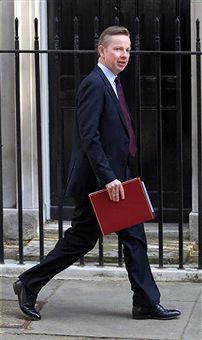 Michael Gove may be a pip-squeak but he has an imperious voice and that formidable
quality of both sounding and being enormously clever. With a faint note of arrogance, he bossed a potentially difficult interview on the Today programme this morning. Tired of defending himself against Ed Balls’ dishonest maxim that what’s good for
bureaucratic process is good for children, Gove changed tactics. He described his bill as a ‘permissive piece of legislation’ and linked it directly to the Blair-Adonis Academy reforms,
which were frustrated by a regressive coalition wedded to the educational status quo. Gove emphasised that the cuts to the school building fund (drawn up by Balls in uncosted form) did not affect
academies: academy status releases funds that are otherwise held by the Local Education Authority. His message was clear: this is a bureaucratic reform and it has been the subject of public and
parliamentary debate for more than five years; it merits no more deliberation; with a new school year around the corner, action is required.
Michael Gove may be a pip-squeak but he has an imperious voice and that formidable
quality of both sounding and being enormously clever. With a faint note of arrogance, he bossed a potentially difficult interview on the Today programme this morning. Tired of defending himself against Ed Balls’ dishonest maxim that what’s good for
bureaucratic process is good for children, Gove changed tactics. He described his bill as a ‘permissive piece of legislation’ and linked it directly to the Blair-Adonis Academy reforms,
which were frustrated by a regressive coalition wedded to the educational status quo. Gove emphasised that the cuts to the school building fund (drawn up by Balls in uncosted form) did not affect
academies: academy status releases funds that are otherwise held by the Local Education Authority. His message was clear: this is a bureaucratic reform and it has been the subject of public and
parliamentary debate for more than five years; it merits no more deliberation; with a new school year around the corner, action is required.
Sarah Montague either didn’t grasp this or simply disregarded it. She took the Balls line exactly, asking questions to which the answer is already know. Will these schools be selective? No, as a cursory glance at the Tories’ green paper on 2007 would tell you. Will these schools be able to ditch the national curriculum? Yes, provided the national curriculum is replaced by a broad and balanced curriculum. These are huge, revolutionary reforms surely they must be awarded the time to be costed effectively? No, these reforms will free schools from LEAs by re-allocating funding; the ideas have been ventilated by two political parties for five years.
With Montague doing a remarkable turn as Ed Balls in Brezhnev-mode, Gove made the obvious logical leap. He noted the precise equivalence of their mindsets. Having revealed the laziness of the
interviewers’ assumptions, and perhaps the latent perspective that value for public money is no more than a hopeless vanity, he extended his analysis to the corporation in general. Gove, now
conducting the interview, asked why the BBC had not examined those bureaucratic instruments so righteously protected by Balls? Some of them, Gove argued, are necessary, less so the directives on
the placement of the class aspidistra. Gove concluded:
‘I believe in value for money. It maybe a concept that was alien to the last government and it may not be a concept that the BBC would like to see applied to public expenditure but I believe that it is important that the taxpayer gets protection for the money that it spent on his or her behalf.’
Mark Thompson et al take note.
Gove is in the Commons now, making his case once again. Gove’s major problem is that only 50 primary and secondary schools will assume academy status in the next academic year. That is nowhere near enough.






Comments